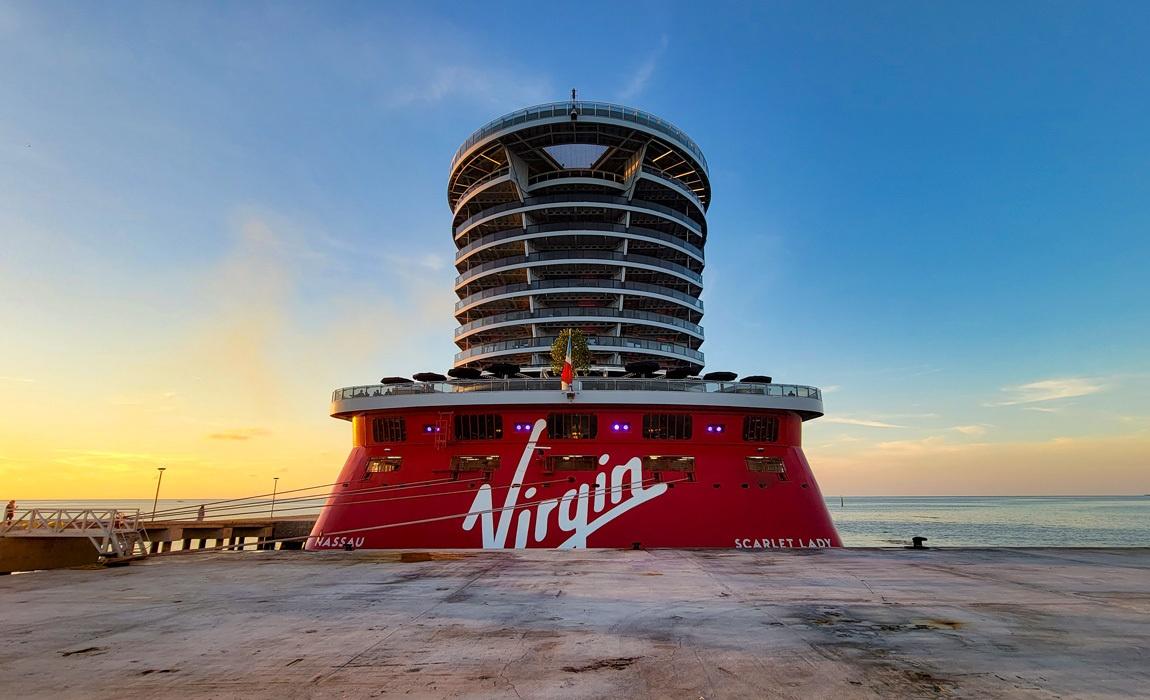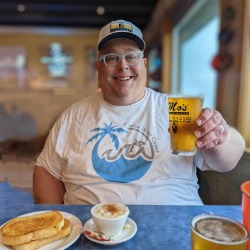If there is one thing that the Virgin brand is known for, it is being innovative in a fun and approachable way. The brand has always been cutting edge and progressive as a tastemaker that does things "because they are the right things to do". That is one of the reasons why we were so excited to sail with them last fall on Scarlet Lady. While they aren't yet sailing on the west coast, we hope it is just a matter of time. Until then though, I think it is important to showcase what they are doing in not just talking the talk about sustainability but actually walking the walk. Beyond me just sharing my own observations though, I wanted to take the opportunity to learn more from Jill Stoneberg - Virgin Voyages Senior Director of Sustainability and Social Impact about why this topic is so important to the cruise line.
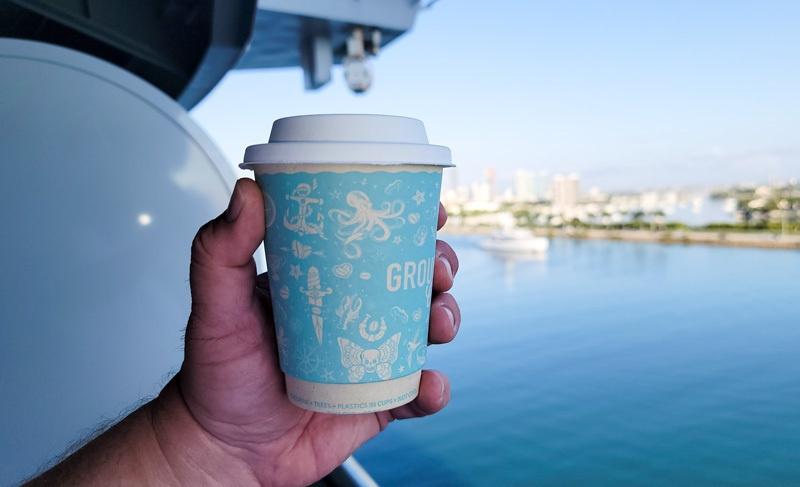
Why is sustainability something that is so core to the Virgin brand?
In a nutshell, Virgin believes it’s important for its companies to not only make a profit but to also contribute positively to society. Every Virgin brand has a purpose and our companies are disruptive. Each thinks about its industry from a unique vantage point. For us and the other Virgin brands, purpose and profit go hand-in-hand. Our mission, “Creating an Epic Sea Change for All,” is at the heart of everything we do.
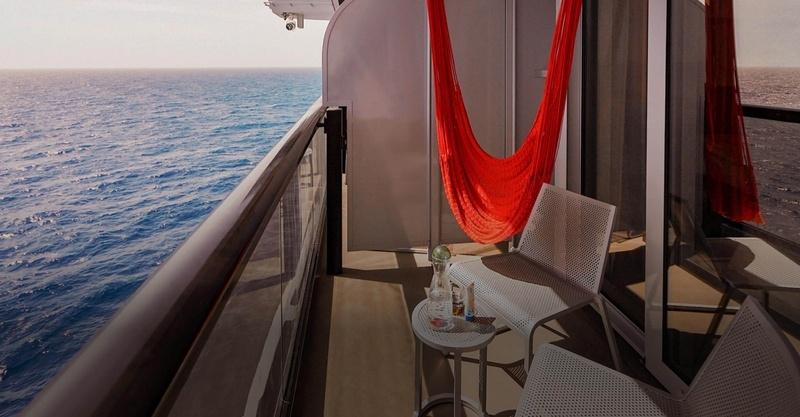
As a new cruise company, you have the freedom to design completely new ships without being held back by "that's how we've always done it" arguments. What are some examples where that helped you improve the cruise experience from a sustainability perspective?
We essentially had a blank canvas and were able to think about ways to incorporate sustainability into the Sailor experience from the very beginning. We could ask, “What does this look like on our ships?” and start with an end goal in mind. For example, looking at waste reduction, we could work backwards and figure out how we could achieve that result – be it eliminating bottled water, nixing buffets, implementing a towel exchange program, etc. As a new brand, we could start from scratch and didn’t have to undo any supply chain agreements or hotel processes. Our purpose truly guided our decisions from the very beginning, and our team was able to define what it means to be more sustainable and factor that into various touch points throughout the voyage.
It was also about offering our Sailors elevated experiences. We swapped out the buffet to offer six signature restaurants, which reduces waste AND offers a better experience. A better experience, for example, means having real utensils and ceramics, thereby cutting down our disposable waste. In the cabins, we offer a smart tech experience, which enhances the Sailor experience AND reduces energy and paper waste. Everything works in unison.
We also paid special attention to sourcing artwork and furnishings. Take our hammocks – who doesn’t love a hammock on their balcony? But we specifically selected Yellow Leaf as our supplier because they have this incredible story. It offers a better experience and has an impact. There’s also the Sailor bands, which are used as a room key and payment method. We partnered with BIONIC Yarn to make them out of marine and coastal plastic. Around the ship, we replaced traditional teak handrails with aluminum, and we added beautiful FSC-certified wooden detailing to the cabins. Choosing our materials was very intentional.
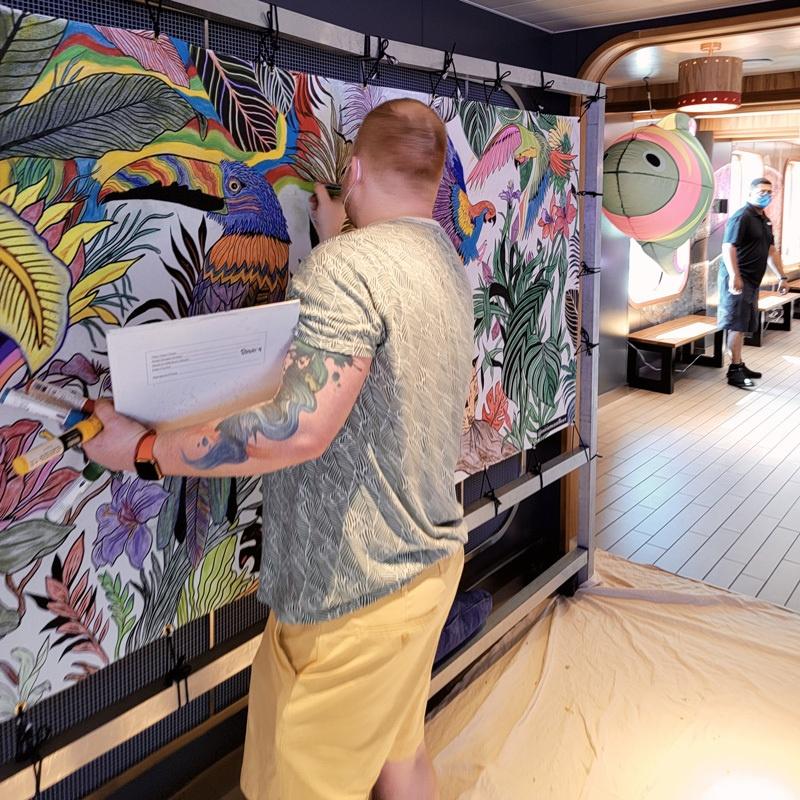
What are some things that most people get wrong about the environmental impact of cruise ships and cruise vacations as a whole?
Most people are surprised to learn that cruise ships can have a similar CO2 footprint when compared to round-trip flights, but as a larger, more visible vessel, cruise ships can often be an easy target. While of course we have an impact, when you break down the travel experience into different segments – taking a cruise vs. flying, staying in a hotel, renting a car, etc. – it has a comparable carbon output. Additionally, the benefits of traveling by sea in the way cruising is offered, not only exposes travelers to new cultures and destinations that may be otherwise inaccessible to some guests, but cruise lines like Virgin are able to create a closed-loop environment where waste and other environmental impacts can be more controlled, and even minimized than some land-based operations. For example, we try to impress upon our guests sustainable practices that they wouldn’t necessarily get from taking a flight, staying in a hotel or renting a car. In a study we conducted before publishing our first Impact Report, we discovered that 50% of our Sailors said their voyage with Virgin inspired them to live more sustainably.
There is a lot of discussion specifically about marine fuels. What powers the engines on Virgin Voyages vessels and what technologies do you use to minimize emissions?
I wish we could say we run on emission-free energy, but unfortunately those solutions aren’t commercially viable and don’t exist at scale today necessary to power cruise ships. Our ships use diesel fuel, including HFO (heavy fuel oil) and MGO (marine gas oil). To minimize fuel impacts on the environment we use hybrid exhaust gas cleaning systems (aka “scrubbers”) and a selective catalytic reduction system (or SCR) to reduce SOx and NOx emissions. We are also a pioneer for using Climeon, which uses waste heat from the ship’s engines to generate electricity, thereby reducing some of our fuel demand.
We recognize that the industry needs to shift away from fossil fuels, and while the technology isn’t available at scale today, everyone is looking at what’s on the horizon. Virgin Voyages and the other lines are asking, “How can we decarbonize?” We need systemic changes in infrastructure, along with tech advancements, and the right policies and incentives from the government to advance low-and zero-carbon carbon fuel solutions. The change won’t happen overnight, but we are committed to the journey ahead and learning from advancements that have happened in other sectors like aviation.
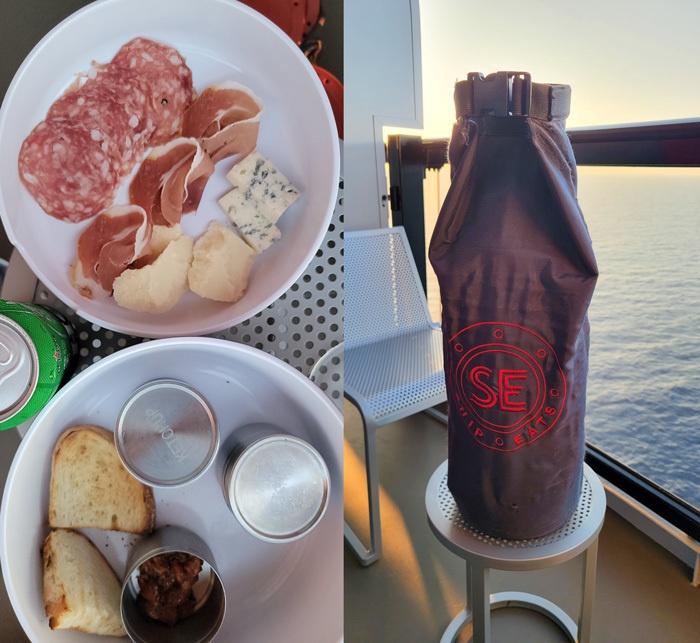
One thing I really liked about my opportunity to sail with you guys last fall was that "sustainability" seems to extend beyond just "power" or "hull design". Is this ultimately a lot more expensive? What are some challenges you faced to make these work? For instance ... why isn't everyone using a water carafe in the room instead of water bottles or tins of condiments instead of glass and plastic bottles?
Sometimes it’s more expensive to be sustainable ( i.e. swapping disposable for reusable items or finding sustainably-sourced products), but it can also cut down on the amount we need and in some cases, save money. There are always trade offs. For example, we try to limit our use of single-use plastics and we have eliminated single-use plastic water bottles. While we don’t have to pay to offload this waste, we needed to install water bottle refill stations and design an operation to allow the delivery of fresh & sparkling water to our cabins. It’s a better experience for our Sailors but it does require more manpower and an upfront investment. We felt these tradeoffs were worth it, and it turns out it’s something our Sailors really appreciate.
Other lines are working to make more eco-friendly changes, but it’s harder for established brands to undo supply chain relationships and existing operating procedures. It’s a big scope of work and it can’t be changed overnight. You need a roadmap to get there, and many are on their way.
What are some exciting areas of cruise ship design that will be making an impact in the future?
This is the decade for taking action on climate change. The future is all about low- and zero-carbon fuels. Ship designs are completed years in advance, before work on a ship even begins, so it’ll be interesting to see how ship design adjusts for future technologies and at a fast enough pace.
Beyond the on-ship experience, shore excursions and the impact guests have when they explore a destination are also important to consider. What does Virgin do to help the local communities manage this traffic in a positive fashion?
From the beginning, our promise has been to offer smaller tours (about 15 people or fewer) and ones that highlight what makes each destination unique. Before we choose where we’ll sail, we consider how we’ll impact that community in a meaningful way. We ask ourselves, “What does a shore excursion look like? Can we showcase unique cultural attractions, authentic eats and incredible sights?”
Virgin Select Tours are those unique to Virgin, and $1 from every tour booked supports our charity partners. We also work with tour operators who meet GSTC criteria. These vendors have gone through a third-party review and certification process for upholding environmental and social impact standards. We’re proud to say that across our portfolio of Shore Things so far, about 65% are with operators that have GSTC certification.
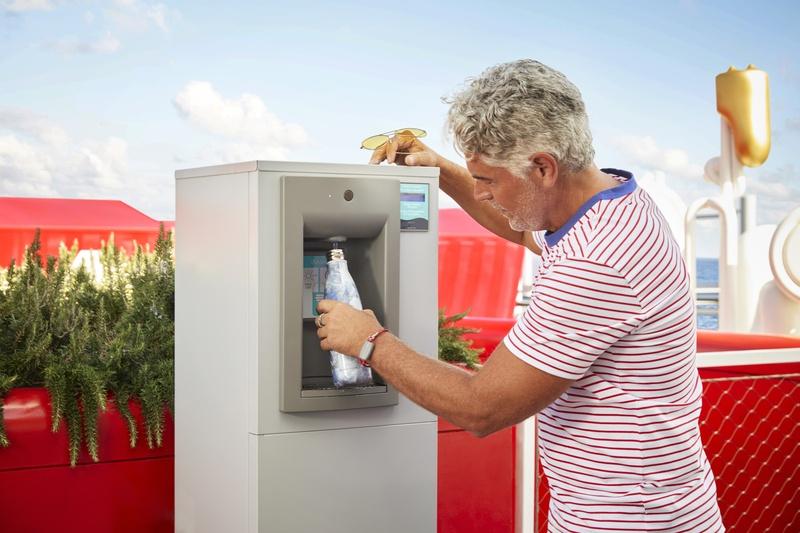
Technology and design are only one part of the equation. What are some behaviors that cruisers can adopt to help make the experience a more sustainable one ... without making it less enjoyable?
We believe that sustainability is a brilliant basic, meaning we try to make the choice easy for our Sailors. We’ve focused on guilt-free indulgence in the sense that we have done all of the worrying for our guests and considered how our Crew are treated, how is waste disposed of, how is the ship cutting down on its emissions, etc. Sailors don’t have to make the hard choices or feel guilty about sailing, allowing them to focus on having the best vacations of their lives. Choices are embedded into the guest experience we’ve designed. They can walk into any of our six signature eateries and find responsibly sourced ingredients along with vegan or vegetarian options. We also try to encourage great habits that Sailors can take home such as using reusable water bottles, using reef-safe sunscreen, grabbing a tote or canvas bag before going on a shore excursion, etc.
We Look Forward To Sustainability Innovations Becoming Standard Soon On Other Cruises
Virgin Voyages is clearly an innovator that is shaking up the industry. In some areas such as transitioning away from the classic "cruise line buffet" an introducing The Galley concept they were at the forefront of an industry trend that we now see variations of on new Carnival and Norwegian ships. In other areas such as water pitchers in the room and thereby allowing sailors to completely eliminate the need for plastic bottles, the industry is lagging behind.
Not only that but they are simultaneously working to make cruising more inclusive with small but noticable meaasures such as empowering the crew to be more than just "servers" as well as their inclusion of all-gender restrooms on the ship. While you could sail one of their ships and enjoy the experience like any other cruise, it is those little things that will allow them to break free of the comoditization of the cruise industry and hopefully be successful.
While I love my west coast cruises to Alaska, Mexico, Hawaii etc. Virgin Voyages will continue to be at the top of my list when it comes time to sailing in the Caribbean and Mediteranean. It's not just about having a great time but knowing too that the company you are sailing with shares your values and helps you make the "right choices".
THAT is the future of cruising and I can't wait to sail with them again soon!
Thanks for reading. We hope this was helpful!
Why stop now?
Participate In Our Polls | Ask or Answer A Cruise Question | Contact Heather to Book Your Next Cruise!
